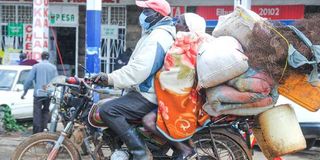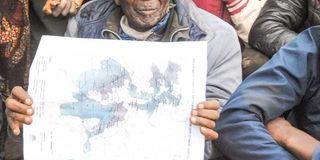State goes against own moratorium, kicks thousands out of forest

A boda boda rider carries a woman who had been evicted from the Mau forest in Marioshoni, Nakuru County, on July 13. PHOTO | JOHN NJOROGE I NATION MEDIA GROUP
What you need to know:
- Dozens of families were rendered homeless after KFS rangers raided their homes, evicted them and set their shelters ablaze.
But in January 2018, the EU suspended funding when a Sengwer, Robert Kirotich, was shot dead allegedly by KFS guards while herding his cattle in the forest.
Last month, thousands of residents were evicted from Mt Elgon Forest to pave the way for afforestation of the water tower.
The government in May this year declared a suspension of evictions for the period of Covid-19 pandemic following calls by UN Special Rapporteurs.
But that the same government is going against its own undertaking only adds to Ms Caren Chematia’s worries. She was not even aware of such a pact. She watched her home go up in flames on Thursday last week and now, her children have no place to sleep and no food to eat.
Ms Chematia, her family and others like her have since spent their nights at a shop in Kapsinedet village in Elburgon Ward of Njoro Sub-county. The shop has been shut for a year, and the owner offered it to the families — at least for now. They are lucky since some families have no place to sleep.
SOCIAL DISTANCING
Ms Chematia says the social distancing measure to contain the spread of coronavirus is not applicable to her and the other families for now. In fact, the contagion is the least of their worries.
“I’ve had to sell my cows and chicken right at this shopping centre. Where would I be moving with cows? I sold three for 5,000 each, yet on a normal day, a cow would go for Sh50,000. I sold the chicken at Sh200 each. The houses were burnt and all we could salvage were clothes and utensils,” she lamented.

A resident of Kapsinendet in Marioshoni, Nakuru County, displays the map showing where the forest land sits on July 12. PHOTO | JOHN NJOROGE | NATION MEDIA GROUP
Ms Chematia and others from her former village were affected by the current evictions targeting residents of Marioshoni area in Elburgon. The government said the locals had invaded forest land and sent Administration Police and Kenya Forest Service officers to kick them out. The evictions entered the eighth day Thursday.
Others, Ms Caroline Chepkoech of Chai Moto in Marioshoni with her three children have to brave heavy rains after her house was razed. When the Nation caught up with her, she was still looking for a place to spend the night.
“I’ve been sleeping in thickets with my children, with no food to eat. We have no place to go or take our livestock,’’ she said, adding, all her belongings were left outside her burnt house because the rains have made the roads impassable.
RENDERED HOMELESS
Dozens of miles away at the Embobut Forest in Elgeyo-Marakwet County, another community, the Sengwer, are in the same boat as that of the Ogiek in Nakuru County.
Dozens of families were rendered homeless after KFS rangers raided their homes, evicted them and set their shelters ablaze.
A Sengwer leader, Mr Elias Kimaiyo, said many community members had left the area in search of food when the raid took place. They were unable to salvage their bedding and other possessions.
“The children who had remained at home fled into the nearby forest from where they watched their homes burn. What is happening now is so heartless, especially during this Covid-19 pandemic,” he said.
The raid is the latest on the Sengwer community, which the government accuses of occupying part of the Embobut Forest. The community, on the other hand, says the forest is their ancestral land.
In 2017, the European Union initiated the Water Towers Protection and Climate Change Mitigation and Adaptation Programme, which was intended to improve the ecosystems of Kenya’s principal water towers while benefiting the nearby communities.
But in January 2018, the EU suspended funding when a Sengwer, Robert Kirotich, was shot dead allegedly by KFS guards while herding his cattle in the forest.
Last month, thousands of residents were evicted from Mt Elgon Forest to pave the way for afforestation of the water tower.
The residents, who are said to have illegally encroached on public land, were evicted from their homes in an operation conducted by KFS officers.
NEIGHBOURING CAVES
They have now relocated to neighbouring caves where they are seeking refuge as they ponder their next move.
Mr Joseph Simatwa, a resident, yesterday told the Nation that they risk contracting deadly diseases as they are spending nights in the cold and going without food after their properties were destroyed.
Mt Elgon Deputy Commissioner David Kosigai said the government would hold talks with the evictees and KFS on where they should be resettled.
Rift Valley regional commissioner George Natembeya accused some members of the Ogiek community of selling their land. He also said they invade government forests and claim they are forest dwellers.
“We know you have sold your own parcels of land, and we will soon kick you out to protect water sources,” Mr Natembeya warned.
UN Special Rapporteurs Balakrishnan Rajagopal and Mary Lawlor said in the wake of the Kariobangi and Ruai evictions that the ejections exposed communities to the dangers of contracting Covid-19.
CONTEMPLATED EVICTIONS
“The evictions not only render thousands of persons homeless without any alternative accommodation, but doing so in the current context of a pandemic violates multiple human rights norms and exacerbates its potential impact on the rights to health and life of thousands of Kenyans,” the UN officials said.
They told the Kenyan authorities to stop any further contemplated evictions, urgently provide assistance to the evictees, and guarantee their rights to shelter, food, water and sanitation.
“They must also put in place a plan, with the full participation of the evictees, to find a long-term solution to their housing needs,” the special rapporteurs said.
But even with the moratorium, thousands of people have been evicted from the 57,000-hectare Mau east stretch, which KFS seeks to reclaim. The targeted areas are Marioshoni, Bararget, Kiptunga and Ol Posimoru.
In the North Rift, the area to be restored is Embobut Forest.
Human rights groups, including Human Rights Watch and Amnesty International, have criticised the manner in which the government is carrying out the evictions.
Additional reporting by Dennis Lubanga and Evans Kipkura





